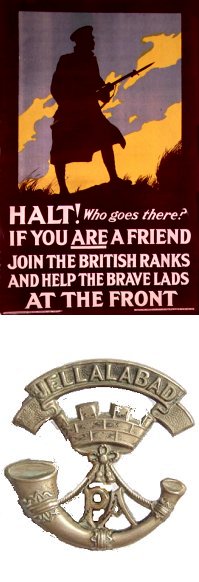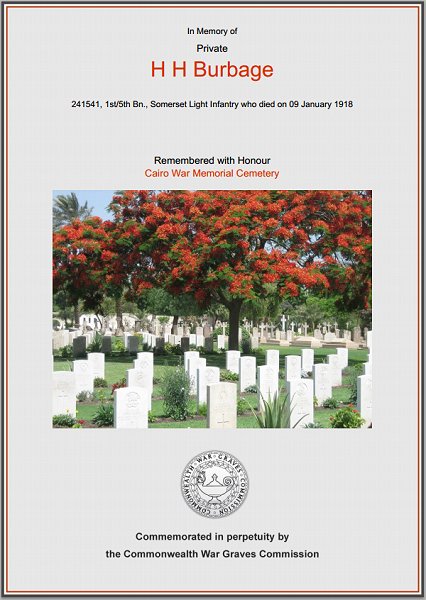yeovil at War
harry henry burbage
Died while in the Egyptian Expeditionary Force
Harry Henry Burbage was born in Yeovil in 1897, the son of ironworks fitter James Burbage (1866-1935) and his wife Elizabeth Jane née Hunt (1865-1940). In the 1901 census James and Elizabeth were living at 6 Addlewell Lane with their children; Florence aged 11, Mary aged 9, Frederick aged 8, Stanley aged 5, Harry aged 4 and William aged 1. The family were still listed there in 1911 but 14-year old Harry, listed as Henry, was still at school.
 It
is not known
when Harry
joined up but he
enlisted in
the Army at
Taunton and
became a Private
(Serial No
241541) in the
1st/5th
Battalion of the
Somerset Light
Infantry. This
was most likely
in the spring of
1916, just
before his older
brother
Frederick
was killed at
the Battle of
Jutland.
It
is not known
when Harry
joined up but he
enlisted in
the Army at
Taunton and
became a Private
(Serial No
241541) in the
1st/5th
Battalion of the
Somerset Light
Infantry. This
was most likely
in the spring of
1916, just
before his older
brother
Frederick
was killed at
the Battle of
Jutland.
The 1st/5th Battalion was a Territorial Battalion formed on 4 August 1914 at the County Territorial Hall, Taunton as part of the South-Western Brigade, Wessex Division. It was initially stationed at Plymouth for a few days and then proceeded to Salisbury Plain. On 9 October 1914 the Battalion sailed from Southampton and arrived at Bombay, India, on 9 November 1914. The battalion remained at Jubbulpore until December, when it proceeded to Ambala. Strenuous training began almost immediately and continued almost for the next year.
In May 1916 a large draft of nine officers and 449 other ranks arrived from England. Harry was almost certainly among this contingent. The battalion was temporarily divided during the ensuing hot weather with some companies going to Chakrata and the remainder to Meerut.
The following months were mainly occupied in training the draft but even in the hills little was done beyond this owing to the exceptionally wet season. The Battalion was reunited in October at Meerut. On 26 April 1917 17 officers and 838 other ranks of the Battalion sailed on HMT Chakdara from Bombay, landing at Suez, Egypt, on 11 May 1917, becoming part of 233rd Brigade, 75th Division - part of the Egyptian Expeditionary Force in Palestine.
Having spent an uneventful two and a half years in India it was now intended that the 1st/5th Battalion was to become involved in the attack on Gaza which had been ordered to take place on the morning of 2 November 1917 although 1st/5th Battalion of the Somerset Light Infantry were ultimately not employed in the attack.
The Regimental History of the Somerset Light Infantry records "Several weeks training at El Arish and Rafa, where long route marches through the burning desert fitted the battalion for the part it was to play in the near future, followed on 28 August Nos 1 and 2 Companies of the Battalion went into the trenches in the Sheikh Abbas area, south of Gaza, and were attached to the Argyll & Sutherland Highlanders for preliminary instruction in trench warfare.
On 12 September 1917 the Battalion took over the Apex right sub-sector of the Sheikh Abbas sector, three Companies in the front line and one in reserve. The front line taken over was approximately 2,000 yards in length. The remainder of September was uneventful, but the final entry in the Battalion Diary is of interest :-
"The health of the Battalion was not quite so good as previous month. Septic sores were very prevalent and 16 cases of dysentery occurred. The enemy's lines opposite Apex Right are nowhere near rather than 2,000 yards to our front-line trenches and the most important work done is by the night patrols. A considerable amount of work has been done on the trenches, 18 new dugouts have been constructed and additional trenches are being dug in our right subsector."
Following the attack on Gaza, the 1st/5th Battalion were next engaged in the Battle of Nebi Samwil, part of the Jerusalem Operations, from 17 to 24 November 1917. General Allenby had decided to attack the Turkish Seventh Army and occupied Jerusalem. This necessitated an advance through the difficult country of Judaea and Allenby's plan of attack was to move through the Judaean hills and break out onto the main Jerusalem-Nablus road, cutting off the Turks in Jerusalem. On 14 November the three brigades of the 75th Division were deployed, with the 1st/5th Somersets occupying the ridges west of El Kesman. They moved on 16 November to take up a line on a range of low, stony hills to the east of Junction Station and remained in this position throughout the 17th, when the operations began. The infantry advance began on 19 November with the 1st/5th Somersets concentrating on the Jerusalem Road, north of Junction station and then proceeding forward. The attack on Enab was carried out by the 1st/5th Somersets in front. According to the Regimental History "There was heavy driving rain as the troops moved forward and mist covered the battlefield, but with great dash the attacking waves advanced and completely drove the Turks from their positions in front of Enab.
For two hours during the early morning of 21 November the village of Enab was shelled heavily by the Turks and, owing to the congested state of the village -packed with troops and animals - casualties were heavy. On 23 November 1917 the 1st/5th Somersets of the 233rd Brigade had again become involved in stiff fighting with the enemy who was posted in strong positions at Nebi Samwil.
The Battalion, which had gone into action on the 22nd November about 450 strong, had suffered 221 casualties in the two day's fighting - 3 officers killed and 6 wounded, 51 other ranks killed or missing and 161 wounded. The 75th Division moved on 26th back to Junction Station, and it was time for, as one diary states: "many men having no soles to their boots: new boots had to be obtained before they could march."
On 10 December the Battalion, being part of 232nd Brigade became Corps Reserve and thus the 1st/5th saw nothing of the fighting for Jerusalem and were able to rest for a while.
Harry Burbage died on 9 January 1918, aged just 21. Since the records state 'died' rather than 'killed' or 'died from wounds' it is most likely that Harry succumbed to disease while hospitalised in Cairo, the main hospital that dealt with the sick and wounded of the Egyptian and Palestinian Campaigns.
Harry Henry Burbage was interred in Cairo War Memorial Cemetery (Grave O.100) and his name is inscribed in the County of Somerset Book of Remembrance in St Martin's Chapel, Wells Cathedral. His name is also recorded on the War Memorial in the Borough - albeit written as Burbage, H rather than the correct Burbage, HH.
gallery

The Commonwealth War Graves Commission certificate in memory of Harry Burbage.